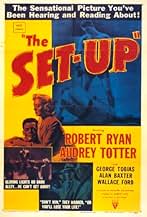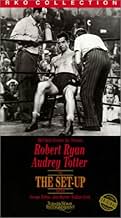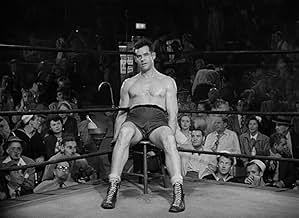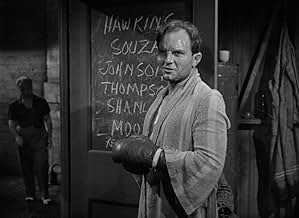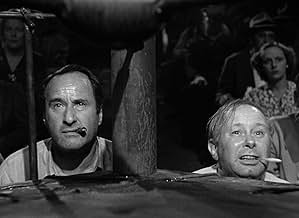VALUTAZIONE IMDb
7,8/10
10.780
LA TUA VALUTAZIONE
Aspettando la solita sconfitta, un manager di boxe accetta delle scommesse da un criminale, senza dire nulla al suo pugile.Aspettando la solita sconfitta, un manager di boxe accetta delle scommesse da un criminale, senza dire nulla al suo pugile.Aspettando la solita sconfitta, un manager di boxe accetta delle scommesse da un criminale, senza dire nulla al suo pugile.
- Nominato ai 1 BAFTA Award
- 2 vittorie e 2 candidature totali
Hal Baylor
- Tiger Nelson
- (as Hal Fieberling)
Kevin O'Morrison
- Moore
- (as Kenny O'Morrison)
Herbert Anderson
- Husband
- (non citato nei titoli originali)
Larry Anzalone
- Mexican Fighter
- (non citato nei titoli originali)
Arthur Berkeley
- Cafe Patron
- (non citato nei titoli originali)
Phil Bloom
- Minor Role
- (non citato nei titoli originali)
Burman Bodel
- Man
- (non citato nei titoli originali)
Recensioni in evidenza
Overshadowed by the more heralded The Champion in 1949, I like this movie better. Maybe the grittiness of this one with its unrelentingly seedy environment and no obvious feel good outcome made it less popular at the time. After seeing it for years on cable, a most welcome sight on DVD. Certainly an Oscar caliber performance by Ryan. The direction and cinematograpy also Oscar worthy. The boxing match itself is a classic, convincingly choreographed. The whole cast down to the smallest part is uniformly fine, with many memorable faces. The sense of anxiety we feel for Stoker mixed with hope and fleeting elation makes quite a compelling story. The movie is 71 minutes and is in `real time` ****1/2 out of *****
If your taste runs to happy endings and beautiful people than stay away from The Set-Up. But if gritty and realistic drama is your taste you can't do better than this noir classic about the world of boxing. The Set-Up anticipated Rod Serling's Requiem For a Heavyweight by a decade as it deals with the same issues about a boxer at the end of his career.
Anthony Quinn might very well have seen Robert Ryan in The Set-Up when he played Mountain Rivera in Requiem For A Heavyweight. Rod Serling must have seen it as well. Both films deal with a boxer at the end of his career, but who has a lot of pride. Manager George Tobias and trainer Percy Helton get an offer from gambler Alan Baxter who is backing an up and coming heavyweight contender Hal Baylor. Ryan is just another step up the ladder, a ladder when Ryan was younger he was climbing. Tobias and Helton agree to take a dive, but no one can broach the subject to Ryan.
Which sets it all up for the final match and the aftermath where Ryan betrayed by all hangs in on nerve and pride alone. What happens afterward is for you to view, but don't expect the same kind of resolution that Requiem For A Heavyweight gave.
A really big surprise here are George Tobias and Percy Helton who normally play comic parts are quite serious here as a pair of fight game characters. The performances are so atypical of the work you've come to expect from both.
Ryan's amateur boxing career no doubt stood him in good stead for this role. He makes a rugged looking boxer who's been through the ring wars over and over again. That helps him in this latest encounter.
The sets are gritty and realistic, in fact I've never seen an urban area done so well until Otto Preminger's The Man With The Golden Arm debuted six years later. Preminger also might have been influenced by The Set-Up when he made his classic.
Although unnoticed at first, The Set-Up has slowly built a reputation as one of the great noir films out of RKO and one of the best boxing films ever made. For myself it certainly influenced a lot of people.
Anthony Quinn might very well have seen Robert Ryan in The Set-Up when he played Mountain Rivera in Requiem For A Heavyweight. Rod Serling must have seen it as well. Both films deal with a boxer at the end of his career, but who has a lot of pride. Manager George Tobias and trainer Percy Helton get an offer from gambler Alan Baxter who is backing an up and coming heavyweight contender Hal Baylor. Ryan is just another step up the ladder, a ladder when Ryan was younger he was climbing. Tobias and Helton agree to take a dive, but no one can broach the subject to Ryan.
Which sets it all up for the final match and the aftermath where Ryan betrayed by all hangs in on nerve and pride alone. What happens afterward is for you to view, but don't expect the same kind of resolution that Requiem For A Heavyweight gave.
A really big surprise here are George Tobias and Percy Helton who normally play comic parts are quite serious here as a pair of fight game characters. The performances are so atypical of the work you've come to expect from both.
Ryan's amateur boxing career no doubt stood him in good stead for this role. He makes a rugged looking boxer who's been through the ring wars over and over again. That helps him in this latest encounter.
The sets are gritty and realistic, in fact I've never seen an urban area done so well until Otto Preminger's The Man With The Golden Arm debuted six years later. Preminger also might have been influenced by The Set-Up when he made his classic.
Although unnoticed at first, The Set-Up has slowly built a reputation as one of the great noir films out of RKO and one of the best boxing films ever made. For myself it certainly influenced a lot of people.
The Set-Up (1949)
This might be the best boxing movie ever made. It's kind of the opposite of "Rocky," of course (this one is about the small points, and not about becoming champion). But it's also the opposite of the two other classics that come to mind: "Raging Bull" and "Body and Soul."
Director Robert Wise made sure that everything here felt authentic and gritty--almost too authentic and gritty. You marvel at all the types in the crowds, inside and outside the ring. You notice the small rooms, the ordinary props, the lack of glamour. If you aren't afraid of the word mise-en-scene, this has created it perfectly. It's transporting.
And moving. Robert Ryan in the lead pulls out some of his best, subtle reactions. He's sometimes prone to strained expressions that may not always fit his character, but here he is thoughtful and determined and showing signs of being the old wise man in the crowd as the younger boxers act cocky or scared.
Then there's the plot drawn out of the title. It's a good thing this doesn't dominate the movie, at least not until the end, because the real plot has to do with a man coming to grips with the end of his career. And with a woman who loves him truly. It's great stuff.
This might be the best boxing movie ever made. It's kind of the opposite of "Rocky," of course (this one is about the small points, and not about becoming champion). But it's also the opposite of the two other classics that come to mind: "Raging Bull" and "Body and Soul."
Director Robert Wise made sure that everything here felt authentic and gritty--almost too authentic and gritty. You marvel at all the types in the crowds, inside and outside the ring. You notice the small rooms, the ordinary props, the lack of glamour. If you aren't afraid of the word mise-en-scene, this has created it perfectly. It's transporting.
And moving. Robert Ryan in the lead pulls out some of his best, subtle reactions. He's sometimes prone to strained expressions that may not always fit his character, but here he is thoughtful and determined and showing signs of being the old wise man in the crowd as the younger boxers act cocky or scared.
Then there's the plot drawn out of the title. It's a good thing this doesn't dominate the movie, at least not until the end, because the real plot has to do with a man coming to grips with the end of his career. And with a woman who loves him truly. It's great stuff.
This is an awfully hard and brutal movie, produced at the end of the brief, rather high end Dore Schary regime at RKO (1946-48), just prior to Howard Hughes' purchase of the studio, which led to the company's slow, agonizing decline that forced it, or rather its new owners, to close it down ten years later. It's the story of an aging boxer, over the hill but still harboring a measure of optimism, really a sort of pride. In this tragic role Robert Ryan is superb. Tough, compassionate, deeply ethical, realistic, and yet with just enough of the dreamer in him to keep him emotionally afloat, Stoker Thompson represents the best qualities of the so-called common man. In an earlier, more heroic age, he might have been a knight; but alas we do not live in such a time, thus his personal qualities go unnoticed by all but his wife. In this role, Audrey Totter is almost as good as Ryan. Some of her scenes are unforgettable, as when she tears up the ticket to her husband's fight and throws it over the bridge into the steam of an oncoming train; or when she watches a bunch of silly teenagers "play" at boxing with a couple of performing puppets, which at first amuses her, then horrify her when she realizes her own and her husband's fate in this little "play" scene.
The film is a masterpiece of design and composition. Director Robert Wise never made a better picture than this. The movie, like High Noon, plays out in real time, and as a result has an air of urgency to it. Adapted from a poem by Joseph Moncure March, which tells essentially the same story, but with the main character a black man, Wise and scenarist Art Cohn take considerable liberties here that purists' might not care for. In the poem the setting is New York, while in the movie it's a tank town called Paradise City, a far cry from New York even if it's in fact less than a hundred miles away, upstate, or in New Jersey or Pennsylvania. The film never makes this clear. Here and there hints are dropped that the setting might be California. It doesn't matter. The Paradise City boxing arena is a place for young guys on their way up and old guys on their way down. It's a million miles from Madison Square Garden, and that's all that counts.
The film's settings are beautifully realized; and Milton Krasner's photography is no less brilliant. The central street, all blinking lights, and yet shadowy and black in odd places, is a perfect visual metaphor for the action of the film; while seldom have the denizens of a small city looked more menacing. Men in garish ties and fedoras jostle each other on the sidewalk as they pass by. They are a hard, apathetic breed, and hungry for sensation. Inside the arena we see humanity at its least admirable, as there is an undercurrent of sadism in even the most innocuous-seeming fight fans, such as a blind man ("go for his eyes!). We sense that these people come not so much to see a favorite boxer win as a hapless boxer lose.
In the center of all this is Stoker, a man with character surrounded by people who couldn't care less. As his handlers, a porcine, toothpick-chewing Percy Helton, and a thick-witted George Tobias, are superb. In a somewhat smaller role, Edwin Max, in pinstripe suit, with pencil-line mustache's, and what look like three soggy Salada tea bags under each eye, is visually perfect as a small-time something, not even hood, just a guy who runs around and does things for the big guy, played by Alan Baxter, a sort of anti-Stoker, a man without qualities who goes to great lengths to show that he has class and principles, when in fact he has neither. The man is a monster, and he doesn't even have guts. When Stoker punches him in the face he lets his goons do the dirty work.
The interior lives of the two main characters in this film suggest an affinity with the humanistic stoicism Hemingway, while the surface is closer to Weegee and Walker Evans. Overall, though, the movie is pure RKO; its courage-in-the-face-of-adversity theme suggests, almost uncannily, this odd man out among the major studios' history and future, and the best qualities of those who worked there.
The film is a masterpiece of design and composition. Director Robert Wise never made a better picture than this. The movie, like High Noon, plays out in real time, and as a result has an air of urgency to it. Adapted from a poem by Joseph Moncure March, which tells essentially the same story, but with the main character a black man, Wise and scenarist Art Cohn take considerable liberties here that purists' might not care for. In the poem the setting is New York, while in the movie it's a tank town called Paradise City, a far cry from New York even if it's in fact less than a hundred miles away, upstate, or in New Jersey or Pennsylvania. The film never makes this clear. Here and there hints are dropped that the setting might be California. It doesn't matter. The Paradise City boxing arena is a place for young guys on their way up and old guys on their way down. It's a million miles from Madison Square Garden, and that's all that counts.
The film's settings are beautifully realized; and Milton Krasner's photography is no less brilliant. The central street, all blinking lights, and yet shadowy and black in odd places, is a perfect visual metaphor for the action of the film; while seldom have the denizens of a small city looked more menacing. Men in garish ties and fedoras jostle each other on the sidewalk as they pass by. They are a hard, apathetic breed, and hungry for sensation. Inside the arena we see humanity at its least admirable, as there is an undercurrent of sadism in even the most innocuous-seeming fight fans, such as a blind man ("go for his eyes!). We sense that these people come not so much to see a favorite boxer win as a hapless boxer lose.
In the center of all this is Stoker, a man with character surrounded by people who couldn't care less. As his handlers, a porcine, toothpick-chewing Percy Helton, and a thick-witted George Tobias, are superb. In a somewhat smaller role, Edwin Max, in pinstripe suit, with pencil-line mustache's, and what look like three soggy Salada tea bags under each eye, is visually perfect as a small-time something, not even hood, just a guy who runs around and does things for the big guy, played by Alan Baxter, a sort of anti-Stoker, a man without qualities who goes to great lengths to show that he has class and principles, when in fact he has neither. The man is a monster, and he doesn't even have guts. When Stoker punches him in the face he lets his goons do the dirty work.
The interior lives of the two main characters in this film suggest an affinity with the humanistic stoicism Hemingway, while the surface is closer to Weegee and Walker Evans. Overall, though, the movie is pure RKO; its courage-in-the-face-of-adversity theme suggests, almost uncannily, this odd man out among the major studios' history and future, and the best qualities of those who worked there.
The Set-Up is directed by Robert Wise and stars Robert Ryan & Audrey Totter. The screenplay was adapted by Art Cohn from a 1928 poem written by Joseph Moncure March. The story (played out in real time) sees Ryan as Stoker Thompson, a 35 year old nearly washed up boxer still trundling around the circuit believing he's still got what it takes to become a champ. In spite of pleas from his fretful wife, Julie (Totter), Stoker gets in the ring with Tiger Nelson (Hal Baylor), a man 12 years younger. Unbeknownst to Stoker, though, his manager Tiny (George Tobias) has struck a deal with underworld gangster Little Boy (Alan Baxter on prime sweaty and icy form) for him to take a dive and let Nelson win.
What first struck me the most watching this was just how vile everyone apart from the boxers are. The fighters are actually the only ones with honesty and integrity running through their veins. These guys are the ones with the self respect being a chief issue for them, they are fighting not just for glory, but for a basic human trait. The first half of the film puts us in the boxers changing room as the fighters wait to go out into the ring. Here we see the number of noble pugilists stripped back to reveal either their fears or their blind beliefs - while they in turn wait to see who comes back victorious or defeated. As they chat amongst themselves the atmosphere is palpable and Wise excellently uses cutaways to the excitable and blood thirsty crowd. The impact is to that of a gladiatorial arena and shows the sport to be seedy yet utterly beguiling at the same time.
Then it's on to Stoker's fight where Ryan is terrific (he actually boxed for College for 4 years). Thompson is a character so stand up, yet driven by foolish pride, it puts Stallone's Rocky Balboa firmly in the shade, his whole "just one punch away" mantra is truly wonderful and heartfelt and leads to one of those endings that are frustratingly brilliant in its bittersweet closure. The whole fight with Nelson has a beautiful fluidity about it (former pro boxer John Indrisano choreographed it), with Milton R. Krasner's photography keeping it grim and humanistic - both in the ring and out on the darkly lit L.A. streets as Totter's conflicted wife ponders a potential battering for her stoic husband.
Boosted up by a towering performance from Ryan, and dripping with a film noir sense of desolation, The Set-Up is a simple but powerful boxing gem. A film that gets down to the nitty-gritty of the fighters and the seedy people that surround them. 9/10
What first struck me the most watching this was just how vile everyone apart from the boxers are. The fighters are actually the only ones with honesty and integrity running through their veins. These guys are the ones with the self respect being a chief issue for them, they are fighting not just for glory, but for a basic human trait. The first half of the film puts us in the boxers changing room as the fighters wait to go out into the ring. Here we see the number of noble pugilists stripped back to reveal either their fears or their blind beliefs - while they in turn wait to see who comes back victorious or defeated. As they chat amongst themselves the atmosphere is palpable and Wise excellently uses cutaways to the excitable and blood thirsty crowd. The impact is to that of a gladiatorial arena and shows the sport to be seedy yet utterly beguiling at the same time.
Then it's on to Stoker's fight where Ryan is terrific (he actually boxed for College for 4 years). Thompson is a character so stand up, yet driven by foolish pride, it puts Stallone's Rocky Balboa firmly in the shade, his whole "just one punch away" mantra is truly wonderful and heartfelt and leads to one of those endings that are frustratingly brilliant in its bittersweet closure. The whole fight with Nelson has a beautiful fluidity about it (former pro boxer John Indrisano choreographed it), with Milton R. Krasner's photography keeping it grim and humanistic - both in the ring and out on the darkly lit L.A. streets as Totter's conflicted wife ponders a potential battering for her stoic husband.
Boosted up by a towering performance from Ryan, and dripping with a film noir sense of desolation, The Set-Up is a simple but powerful boxing gem. A film that gets down to the nitty-gritty of the fighters and the seedy people that surround them. 9/10
Lo sapevi?
- QuizThe clock on the square at the beginning shows 9:05 PM, and the same clock at the end shows 10:16 PM. The movie takes place in real time.
- BlooperAfter the big fight, when Stoker is in the locker room, he opens his locker and takes out his clothes and shoes. In two subsequent shots his shoes are back in the locker, and then in a fourth shot he removes his shoes from the locker a second time.
- ConnessioniFeatured in Film Review: Robert Wise (1967)
I più visti
Accedi per valutare e creare un elenco di titoli salvati per ottenere consigli personalizzati
- How long is The Set-Up?Powered by Alexa
Dettagli
- Data di uscita
- Paese di origine
- Lingua
- Celebre anche come
- El luchador
- Luoghi delle riprese
- The Hill Street Tunnels at 1st, Bunker Hill, Downtown, Los Angeles, California, Stati Uniti(Staircase over tunnel scenes, the overlook where Julie contemplates suicide as train passes. Location was the Hill Street Tunnels, including the pedestrian staircase leading to overlook. Location was just north on Hill Street from 1st Street. Erected in 1913 and demolished in 1954 to make way for Los Angeles County Courthouse and Hall of Administration.)
- Azienda produttrice
- Vedi altri crediti dell’azienda su IMDbPro
- Tempo di esecuzione
- 1h 13min(73 min)
- Colore
- Proporzioni
- 1.37 : 1
Contribuisci a questa pagina
Suggerisci una modifica o aggiungi i contenuti mancanti

